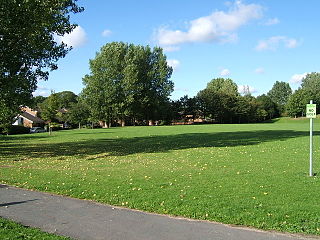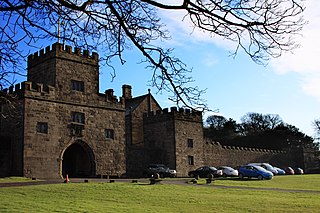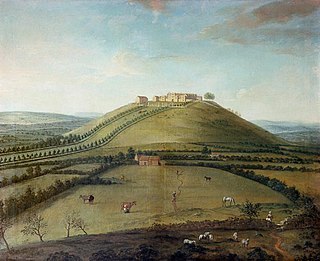Hoghton is a village in Lancashire, England.
Hoghton may also refer to:

Isaac Ambrose was an English Puritan divine. He graduated with a BA. from Brasenose College, Oxford, on 1624. He obtained the curacy of St Edmund’s Church, Castleton, Derbyshire, in 1627. He was one of king's four preachers in Lancashire in 1631. He was twice imprisoned by commissioners of array. He worked for establishment of Presbyterianism; successively at Leeds, Preston, and Garstang, whence he was ejected for nonconformity in 1662. He also published religious works.
Horton may refer to:
Houghton may refer to:
The name Haughton may refer to:

Clayton Brook is a large residential estate in Lancashire, between the city of Preston and the town of Chorley. It forms part of the Clayton-le-Woods civil parish, and is in the Clayton-le-Woods North ward of the borough of Chorley. Lying next to the industrial estate of Walton Summit, one-time terminus of a branch of the Lancaster Canal, it also neighbours Clayton Green, Hoghton and Brindle, and is not far from the small town of Bamber Bridge. Clayton Brook Village as it is often termed, is bounded by the A6 road and the M61 and M65 motorways, and is conveniently near the M6 motorway.

Hoghton Tower is a fortified manor house two-thirds of a mile (1 km) east of the village of Hoghton, Lancashire, England, and standing on a hilltop site on the highest point in the area. It takes its name from the de Hoghton family, its historical owners since at least the 12th century. The present house dates from about 1560–65.

Hoghton is a small village and civil parish in the Borough of Chorley, Lancashire, England. At the 2011 Census, it had a population of 802. Brindle and Hoghton ward also includes the parish of Brindle.

The High Sheriff of Lancashire is an ancient officer, now largely ceremonial, granted to Lancashire, a county in North West England. High Shrievalties are the oldest secular titles under the Crown, in England and Wales. The High Sheriff of Lancashire is the representative of the monarch in the county, and is the "Keeper of The Queen's Peace" in the county, executing judgements of the High Court through an Under Sheriff.

Riley Green is a hamlet, part of the village of Hoghton, within the Borough of Chorley, Lancashire, England. It is located at the junction of the A675 and A6061 roads, between Preston, Blackburn and Chorley. The hamlet consists of a small number of houses and two pubs - the Royal Oak on the A6061, and the Boatyard on the A675 beside the Leeds and Liverpool Canal. Most of the surrounding area is pasture land. There is also a marina at The Boatyard, where many narrowboats are moored, and some are for hire, and there is a cruising restaurant. The original route to Hoghton Tower starts in Riley Green, however it is now only a track as a new route was built straight up to the Tower when motorised transport came to pass. The village is on the Blackburn Bus Company bus route from Burnley to Preston and near junction 3 of the M65. Boats were formerly constructed at the Boat Yard in the village which the Boatyard pub is named after. The Boatyard was refurbished by the brewery Thwaites in 2016 and reopened as the Grill and Grain but was destroyed by fire in 2017.
The Hoghton or Houghton, later Bold-Hoghton, later de Hoghton Baronetcy, of Hoghton Tower in the County of Lancashire, is a title in the Baronetage of England. It was created on 22 May 1611 for Richard Hoghton, Member of Parliament for Lancashire. The Hoghton family had been landowners in Lancashire since the reign of King Stephen and had been Knights of the Shire for Lancashire since the 14th century. The second Baronet represented Clitheroe and Lancashire in the House of Commons and was a Royalist leader during the Civil War. The third and fourth Baronets both sat as Members of Parliament for Lancashire. The fifth Baronet was Member of Parliament for Preston and East Looe while the sixth and seventh Baronets represented Preston. The eighth Baronet assumed the additional surname of Bold. In 1892 the ninth Baronet resumed, by Royal licence, the ancient family surname of de Hoghton.

Sir Richard Hoghton, 1st Baronet was a politician who sat in the House of Commons between 1601 and 1611.

St Leonard's Church is an Anglican church in Walton-le-Dale, Lancashire, England. It is an active parish church in the Diocese of Blackburn and the archdeaconry of Blackburn. In 1950 it was designated as a Grade II* listed building. Parts of the church date from the 16th century and the nave and transepts were rebuilt in the early 20th century.

Sir Gilbert Hoghton, 2nd Baronet was an English politician who sat in the House of Commons variously between 1614 and 1640. He was a Royalist leader during the English Civil War.

Holy Trinity Church is in the village of Hoghton, Lancashire, England. It is an active Anglican parish church in the deanery of Leyland, the archdeaconry of Blackburn, and the diocese of Blackburn. The church is recorded in the National Heritage List for England as a designated Grade II listed building. It is a Commissioners' church, having received a grant towards its construction from the Church Building Commission.
Horton is an Anglo-Saxon surname, deriving from the common English place-name Horton. It derives from Old English horu 'dirt' and tūn 'settlement, farm, estate', presumably meaning 'farm on muddy soil'.
Hoghton is a civil parish in the Borough of Chorley, Lancashire, England. It contains 16 buildings that are recorded in the National Heritage List for England as designated listed buildings. Of these, two are listed at Grade I, the highest of the three grades, and the others are at Grade II, the lowest grade. The major building in the parish is Hoghton Tower; this and associated structures are listed. Otherwise the parish in mainly rural, and a number of farmhouses and farm buildings are listed. The other listed buildings consist of two churches, a former school, a war memorial, and a railway viaduct.
Houghton Hall may refer to:
Richard Houghton or Hoghton may refer to:
Sir Henry Philip Hoghton, 7th Baronet (1768–1835) was a British politician who sat in the House of Commons from 1795 to 1802.

Sir Henry Hoghton, 5th Baronet (c.1678–1768) of Hoghton Tower, Lancashire was a British politician who sat in the House of Commons between 1710 and 1741. He had strong dissenting religious views which sustained his militancy against the Jacobite rebellions.